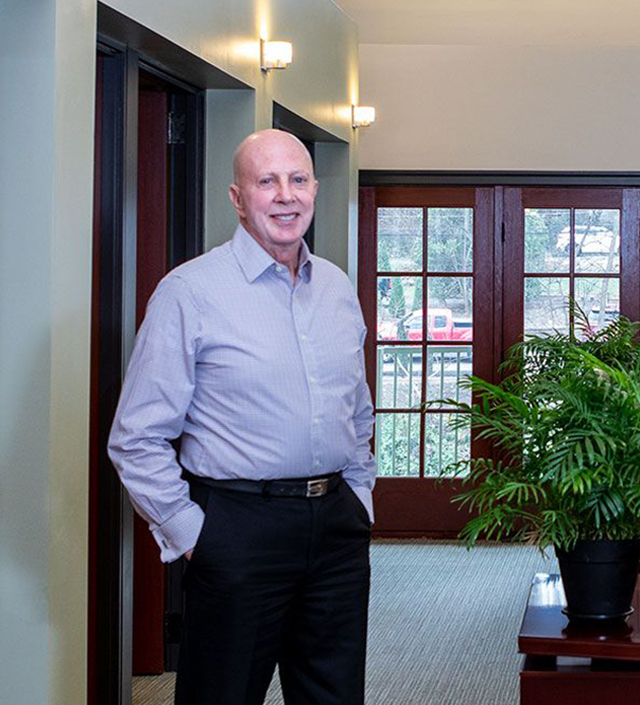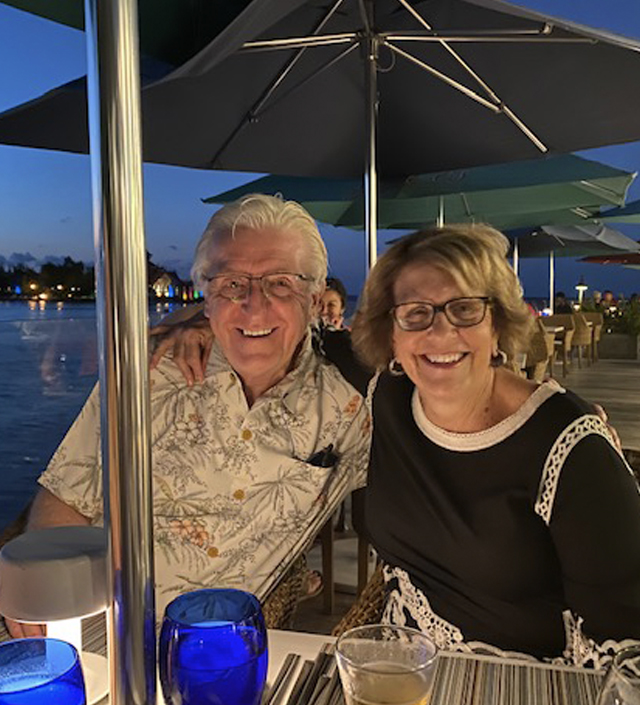Editor’s Note: This article is part of a series Rethinking65 is doing on older advisors who are continuing to work. You may also be interested in reading our articles on Don Rembert and Dick Wendin (both 82), Bob Connell (73) and Minoti Rajput (70). Want to suggest an advisor for the series? Contact Editorial Director Jerilyn Klein.
David Demming, 74, was having a bout of getaway deprivation, brought on by COVID restrictions.
He’s been in the practice of financial planning since 1979, and he founded Demming Financial Services Corp. in Aurora, Ohio, about 40 years ago.
“This is the longest I haven’t been out of the office for 25 years; my diving trip was cancelled in 2019 and again in 2020, because of COVID, so it’s been rescheduled again, for this year,’’ says Demming, who became a proficient scuba diver when he turned 50.
He was set to depart on April 21 for a 16-day trip to Egypt, which included diving from the Red Sea Aggressor Livaboard for six days. [He traveled shortly after this interview and shared some great photos.]
While he was away, his son, David Demming, Jr., a CFP and vice president and chief investment officer of the firm, plus a staff of 15 employees, including five other CFPs, minded the shop. That’s a sea change from the way it was when Demming began his financial planning practice, alone.
In those years, he worked 80 to 100 hours weekly, and was away from home so much that David Jr., at age 3 asked, “Does Daddy live here?’’

Demming Financial Services Corp. directly manages north of $500 million on an independent, third-party platform, and another $100 million-plus is directed through its clients’ employer sponsored retirement plans.
The majority of its financial planning clients are in the $500,000 to $10 million net worth category.
Humble Beginnings
Back in what Demming calls his humble beginnings, the early 1970s, he abandoned his plans to teach at the college level. A combination of social unrest in Cleveland, where he student taught at an inner city school after the 1966 Hough Riots, and an inability to finalize his dissertation sent him looking elsewhere.
“By an accident of fate, my mother was a Welcome Wagon representative in Westlake, Ohio, and one of the businesses that they promoted was the firm of one of the first CFPs in Ohio.’’
He met the CFP, they talked, and Demming did a quick turnaround.
“I changed careers, and I had a lot of good negative experience, meaning that I developed an appreciation of what I didn’t want to do!’’
When asked what he chiefly gained wisdom about, he says “never sacrifice your scruples and always be honest with yourself and (your) clients, even when it hurts.’’
What he saw in those early years were planners who didn’t always act in the best interest of their client; he knew he had to go the opposite route. After being affiliated for several years with a “very caring and giving CFP,’’ Demming became a CFP himself. He also married and began life with a woman whom he described as being “very involved in the business; she controls the check book.’’
At the start of their marriage, Demming and his wife, Gail lived in a rural area outside of Cleveland. He was working long hours and they were planning to have children. The idea of being alone in an isolated area with a newborn didn’t appeal to Gail Demming.
“My wife was teaching and we were going to have children, and she said, “I am moving with or without you. You’re welcome to come!’ The house we had in the country was not conducive to a family life. So, we moved to where we are, which is within walking distance of where our office is.’’
Demming set up business in a historical landmark: A 19th century train station built by the New York, Pennsylvania and Ohio Railroad, which was bought by the Erie Railroad in 1941. The last train left in 1977, the rails were taken up, and the National Register of Historic Places designated the building as historic in 1986.
Expansion and Continuity
The original building suited the firm’s purposes in the early years but as time passed, business multiplied and the staff grew to 14, so the 1,600-square-foot building became a tight squeeze.
“We just finished a million dollar project consistent with the face-print of the original building, because you can’t change the shell of the original. A very good historical architectural firm replicated the storage barns from the 19th century that were on the site and now all the buildings are loosely connected, and we have about 5,000 square feet.’’
More space enabled the firm to hire more people — in April five new staffers, including an operations manager, were hired; their average age is 30.

“Why? So that when certain people are no longer here, they won’t miss us. I want continuity so that I don’t have to worry about chasing the last buck,’’ says Demming.
From his peak of about 100 hours weekly, Demming is down to 50 hours, a full-time workload for many.
He now has time to exercise at a gym, but during COVID, he has worked out at a gym he put together in one of the refurbished garages on the train station property. For a time, he was a partner in an Aurora brewery, since closed. He arrives at work at 7:45 a.m. and leaves earlier than in the old days, but he still participates in doing 200 to 300 client reviews yearly.
“Why should I retire? I’ve loved it all: The office, the staff, the clients, the game. But when I was young I was cutting off relationships because I worked all the time.”
A New Perspective
Demming says he still enjoys his job because it demands that he deal with “the challenges of the human condition.”
“Why should I retire? I’ve loved it all: The office, the staff, the clients, the game. But when I was young I was cutting off relationships because I worked all the time.”
“I’m in a different position today than 43 years ago and I’m very thankful for that,” he says. “And I’m not asking our team to make the sacrifices that I made.”
Most of his clients are from the greater Cleveland area, about 30 miles northwest of Aurora. Arkon is about 28 miles southwest. Clients come from 40 states in the U.S.
Demming, who has a big personality, spent many years skiing and golfing, and made contacts through these sports.
“We specialize in working with executive compensation for the highly compensated and also working with intergenerational transfers, which requires psychological as well as financial help. For instance, one of our couples in Boston is making an offer to their daughters: ‘Dollar for dollar, you put up the money, and we will match it.’
“What they’re doing is helping their children create good habits in a positive environment. It’s values based and we’re assisting and collaborating with these clients.’’
Demming says his firm “continues to add the children and the grandchildren of our clients. My next appointment at 1 p.m.? I buried her father who was our client; he died at 90, and she’s been retired for some years.’’
His son, who has two sons, 8 and 10, is practicing financial planning in an industry changed since his father began his career.
“I kid Karen (Bordonaro, a CFP with the practice), who came from the brokerage business, that I saved her from the dark side. The insurance industry and the brokerage industry have a different agenda; and so does banking. As an RIA, we are independent but we are held to a fiduciary standard.
“Certain old-line practices are still there but they are diminishing. We don’t see the same dominance there with the insurance and brokerage industries. People are leaving and getting rid of the overhead costs and revenue sharing.’’
Finding Balance
Clients of Demming’s firm get pep talks on the necessity of long-range thinking.
“Look at the horizon, look at reasonable time frames, that’s what financial planning is all

about. You create the perspective of where you are, what do you want, and whether your timeframes are rational, whether they make sense.
“It’s not about dreaming; find a practical application and work within the limitations of what you have.’’
Aside from scuba diving, (“It’s very forgiving; it’s like floating in amniotic fluid.’’), Demming and his family spend time at their Lake Chautauqua home about 145 miles northeast in New York state. He’s an avid underwater photographer and he still plays golf, although tennis and skiing were shelved owing to rotator cuff injuries.
A role model is the 26th president of the United States, Teddy Roosevelt, who in his retirement from politics, led a two-year expedition to the Amazon. Demming hasn’t arrived at the retirement phase yet.
“The reality is: I have always had a thing; which was to run like hell. My hero is Teddy Roosevelt, who said, ”Run like hell and then drop dead.”
In a four-decade career in journalism, Eleanor O’Sullivan has reviewed many books on best practices for financial advisors, has written for Financial Advisor and the USA Today network, and was movie critic for the Asbury Park Press.







